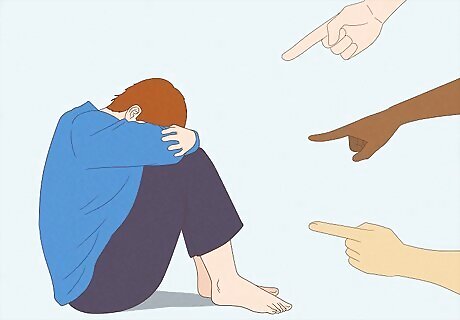
views
- Emotional numbing is when you emotionally shut down or “freeze” in overwhelming situations.
- You may shut down emotionally because you’re feeling stressed, anxious, or have experienced something traumatic.
- Talk to a loved one, journal, take deep breaths, or move your body to cope with emotional numbing.
What does it mean to shut down emotionally?

Shutting down emotionally is when you zone out during intense situations. Also known as emotional numbing, shutting down emotionally is a form of dissociation. For some, when the mind is overwhelmed by stress or anxiety, they subconsciously detach from the current moment to protect their emotional well-being. This can cause a lack of interest and indifference. Think of it like “freezing” the body and mind. When you shut down emotionally, you’ll likely have dissociative symptoms, such as: Staring off into the distance Feeling isolated or detached Being less excited about hobbies and interests Losing track of time Denying situations and realities
Why do people shut down emotionally?

People shut down emotionally to cope with traumatic situations. When you dissociate or emotionally shut down, your body is likely protecting you. Dissociation is a natural response to trauma or fear that can’t be controlled and may be triggered by: Ongoing trauma and/or abuse Stressful situations or experiences Anxiety, depression, or PTSD Alcohol or medication
How do you cope with emotional numbness?

Cope with emotional numbness with a support system and mindfulness. While shutting down emotionally is a normal response to trauma and intense situations, it’s not something you have to go through alone. There are plenty of healthy ways you can cope with dissociative symptoms and feel more connected with yourself. Try these coping mechanisms to feel more grounded: Connect with friends and family to create a strong support system. Go for a walk or move your body however you like. Practice mindfulness by meditating or journaling. Try grounding techniques, such as deep breathing and noticing 5 objects that are around you. Visualize a place where you feel safe and comforted. Ensure that you’re getting plenty of rest each night (ideally between 7 and 10 hours). Eat a healthy and balanced diet full of nutritious foods. Talk to a doctor or licensed therapist if you experience emotional numbness or dissociation for extended periods of time.
What to Do When Someone Shuts Down

Take a break from the conversation. As Dr. Liana Georgoulis, a licensed clinical psychologist, says “Don’t communicate if you’re overwhelmed and flooded with too much emotion.” Give yourself time to process and recover from the situation. Then, return to the conversation when you’re both ready.

Write down what you’re feeling. Even if you take a break from the conversation, that doesn’t mean your feelings have to go unheard. Jot down any thoughts you may have so you can bring them up later.

Soothe yourself. Protect your mental health by reading, meditating, or going for a walk. This can help you relax and process your thoughts.

Stay calm. It can be frustrating when someone you know shuts down, but remember, it’s an involuntary response. Remaining calm and patient will show just how much you care.

Be assertive. When you return to the conversation, communicate clearly and efficiently. Georgoulis recommends “taking turns and hearing each other’s perspectives.” Use “I” statements to express your feelings, and avoid blaming or accusing them.

Reset boundaries. If something was brought up that triggered a loved one to stonewall, or refuse to respond or communicate, set new boundaries. Ideally, agree to take a break if they feel overwhelmed or upset, then come back together to discuss the issue calmly and respectfully at a later point in time. Emotional numbing and stonewalling are slightly different. Stonewalling is a tactic used to shut someone out during a fight or conflict, whereas emotional numbing is detaching yourself from a difficult situation or emotion.



















Comments
0 comment